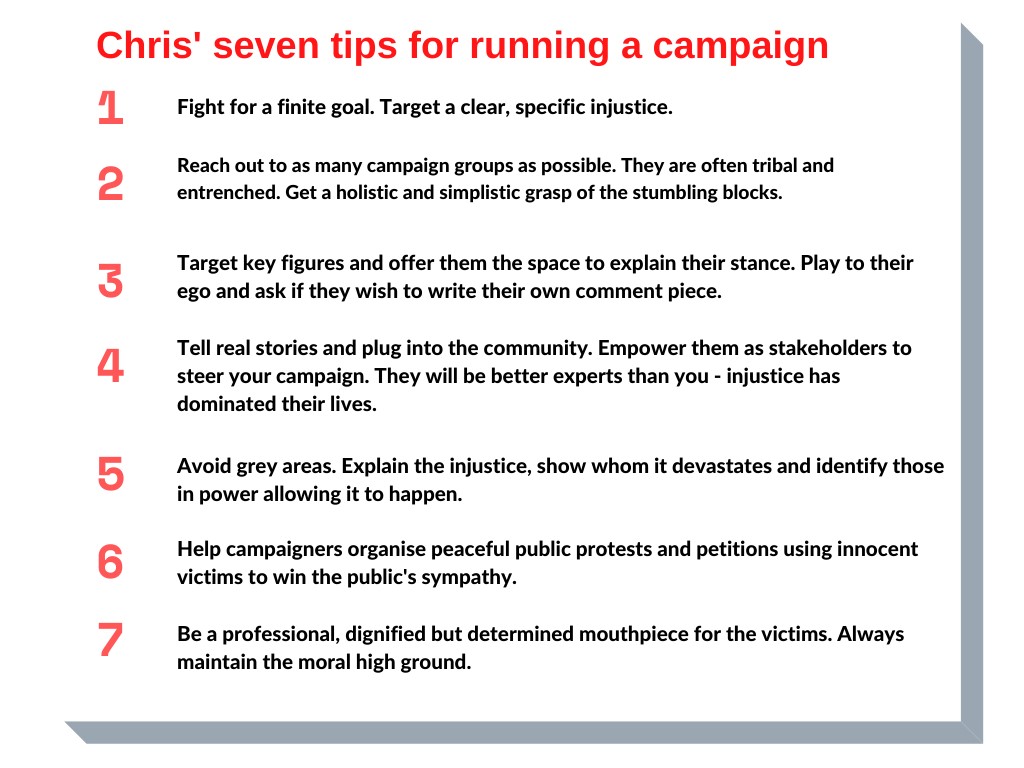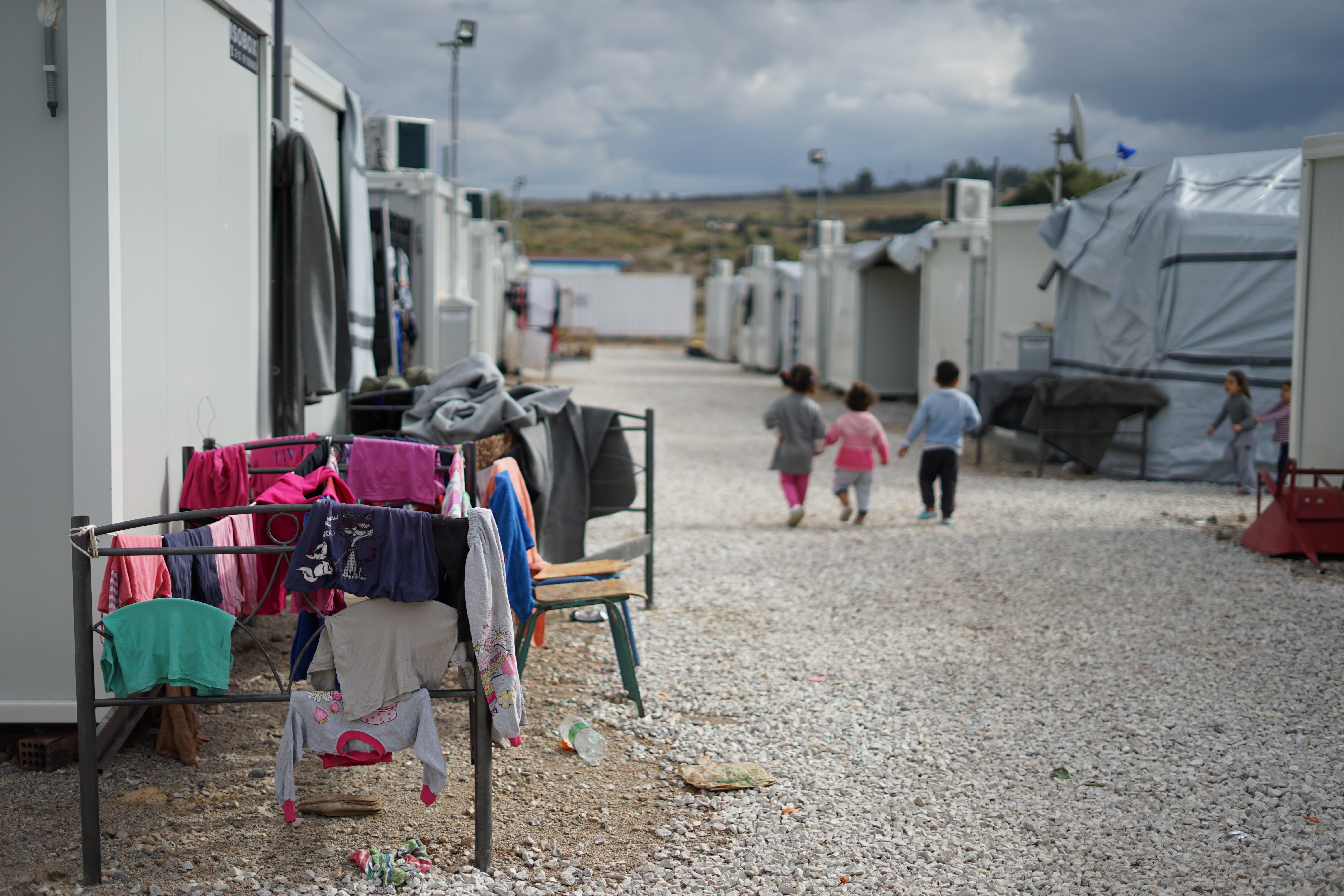
Image: AP Photo/Matt Dunham
Jake Helm spoke to journalists about the stories behind their media campaigns.
In recent times, it feels like journalism has taken a beating. With allegations of fake news and misinformation constantly swirling around the journalistic landscape (often aided by the toxic environment of social media), it’s sometimes easy to forget what sits at the heart of journalism: reporting in the public interest.
Campaigns uphold this value. Amidst the turbulence of the past year, the media has risen to the challenge of responsible reporting via campaigning journalism – exposing faults and championing worthy causes.
Four journalists reveal to XCityPlus the stories behind their campaigns and their tips on how to run a successful one.
Chris Riches, North-West Correspondent, Daily Express
Last year, Chris Riches won Campaign of the Year at the Society of Editors Awards and Press Gazette’s British Journalism Awards for his two-year campaign to secure a US pharmaceutical’s life-saving drug for NHS patients with the genetic condition cystic fibrosis (CF).
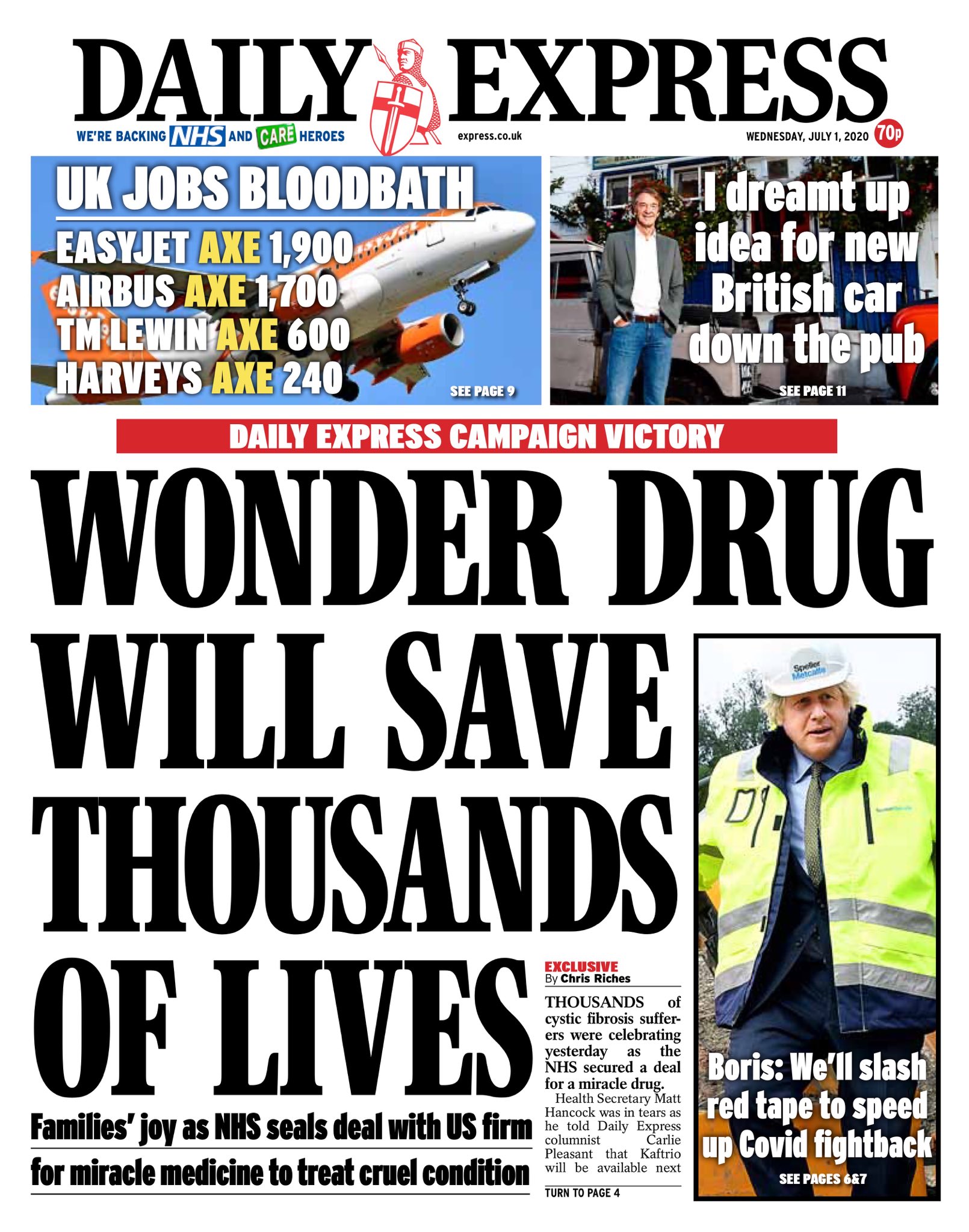
What did your campaign involve?
Our campaign began after a rather innocuous chat with the parents of a little girl called Ayda Louden who desperately needed Vertex’s Orkambi, a life-saving drug for the cystic fibrosis community.
For four years the community had been fighting unsuccessfully for Orkambi and struggled to get much national media attention.
Years of public blame-game statements meant the NHS and Vertex were refusing to negotiate anymore. So, we shamed both by running daily heart-aching stories of sick children struggling to breathe due to lack of the wonder pills.
In April 2019 we brokered an end of their year-long impasse and forced the Vertex CEO to fly over from America to meet UK health officials at Westminster.
We kept the pressure on and in May 2019 accompanied sick two-year-old Eve Jones to 10 Downing Street with 65 yellow roses, each stem wrapped in a CF sufferer’s pleading letter.
“Next we got 29-year-old sufferer Carlie Pleasant to live out her journalism dreams by interviewing Health Secretary Matt Hancock”
Yellow is the campaigning colour for CF sufferers and often children who cannot pronounce ‘cystic fibrosis’ think you are calling it ’65 roses’.
Then, in July 2019, our ‘Laydown4CF’ Parliament Square protest was attended by dozens of MPs. We even achieved the near-impossible – getting former Labour Shadow Chancellor John McDonnell to wear a Daily Express campaign T-shirt.
Next we got 29-year-old sufferer Carlie Pleasant to live out her journalism dreams by interviewing Health Secretary Matt Hancock – and then quiz Vertex CEO Dr Jeff Leiden.
The mother-of-one left Mr Hancock in tears by asking ‘If I die before getting Orkambi, can you explain why you failed my two-year-old baby boy?’
That contact between Carlie and Hancock was the clincher. He was emotionally and physically invested in our campaign from that point.
What happened after Matt Hancock got involved?
We campaigned for Vertex’s newest drug Kaftrio – at that time only available on trial in the US – which was described as ‘almost a cure for CF’. We started by battling for four gravely ill sufferers – Nicole Adams, Darren Waite and Karis Dean – to get that trial pill directly from the US firm.
I remember the night before Christmas 2019 when Nicole texted me from her intensive care bed in Belfast: ‘I’m dying Chris’ she wrote. She then took off her oxygen mask and sang Elton John’s ‘I’m Still Standing’ to me down the phone from her ICU bed.
“When I first made contact with cystic fibrosis families I vowed the Daily Express would stick by them until the end – I’m proud to say we did that”
Within weeks we had helped all four access free trial versions of Kaftrio and all are not only thriving, but even running and riding bikes.
In June the NHS agreed on a full UK Kaftrio deal, signed before the drug was even approved for use by regulators – which must be an NHS first. When I first made contact with cystic fibrosis families I vowed the Daily Express would stick by them until the end – I’m proud to say we did that.
What was the best thing about backing this cause?
I have made long-lasting friendships among CF campaigners. Seeing the joy on those people the day the two drug deals were announced made me incredibly proud to be a journalist and feel I helped in some small way enable this to happen. I regularly get updates from CF sufferers on these drugs explaining how it has transformed their lives. It’s very humbling.
What was the biggest challenge of running this campaign?
CF specifically is an attritional condition that shortens life. Whether that happens slowly or dramatically depends on the drugs they can access. That is a big burden to carry.
In January 2020 I fought for emergency Kaftrio for gravely-ill 13-year-old CF sufferer Ayden Cochrane. I was definitely emotionally involved and my elation when we got him the drug was shattered when he died days later before doctors could administer it. I was wracked with guilt at not getting him it sooner. I remain in contact with his mum Tracey and take solace in her assurance I did all I could. Ayden’s the only CF sufferer I’ve personally met that has died, and I’ve tried to channel that emotion into fighting on for others.
Eleanor Hayward, Health Correspondent, Daily Mail
Eleanor Hayward was part of the team that launched the Let Them Hold Hands campaign in November last year. The campaign called on an end to the visiting ban at care homes which meant 400,000 residents had been banned from seeing their families since March.
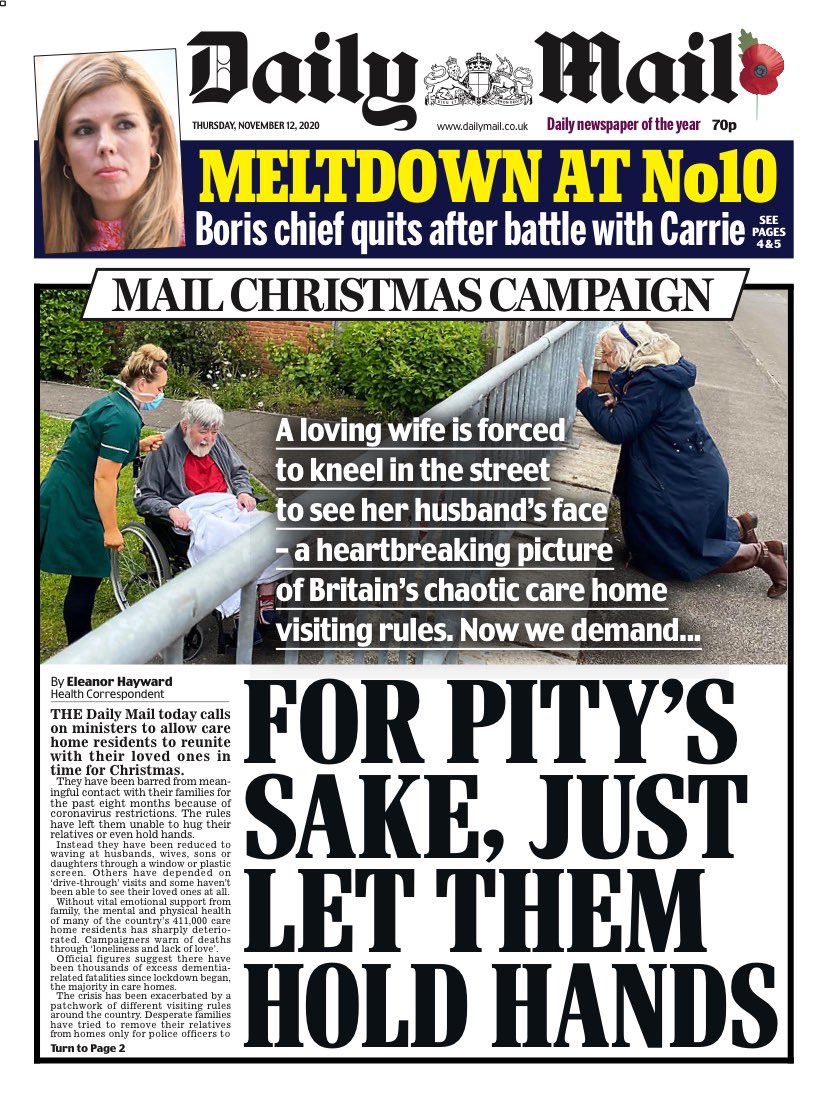
Why did you decide to support this cause?
There were some truly heartbreaking stories of husbands and wives who had been married for decades but were now banned from even holding hands. The visiting restrictions meant thousands of care home residents had died without the chance to hug their families goodbye, and others had died from loneliness and isolation. It seemed cruel and unnecessary. Many Daily Mail readers were directly affected, making it a good issue to campaign on.
What was one thing you learnt from running the campaign?
I learnt a lot about the importance of building good relationships with contacts who will trust you. Newspaper campaigns can go on for months – or years – and you need people who will come to you with stories, or do you a favour and pick up the phone at 8pm when you need a last-minute quote. It is very important that you develop good relationships and don’t burn any bridges.
“One month after we launched, the Prime Minister announced new national guidelines that would allow all care home residents to hold hands and hug their relatives once again”
What was the best thing about running a campaign?
It’s great to see it having an impact and making a difference – it’s what everyone goes into journalism for. One month after we launched, the Prime Minister announced new national guidelines that would allow all care home residents to hold hands and hug their relatives once again.
Martina Lees, Senior Property writer, The Times and The Sunday Times
Martina Lees broke the news in The Sunday Times that fallout from the Grenfell fire could leave up to 1.5 million flats — 6 per cent of homes in England — unmortgageable for years and risks hitting the whole housing market. In response, the paper received over 400 letters, inspiring Lees to launch a campaign to expose the scandal. It was shortlisted for the Campaign of the Year at the Press Awards 2020.
What was one thing you learnt from running the campaign?
It’s essential to build political support for your campaign. Meet with MPs and others in positions of power to get them on board, and influence the government and business leaders to bring about change.
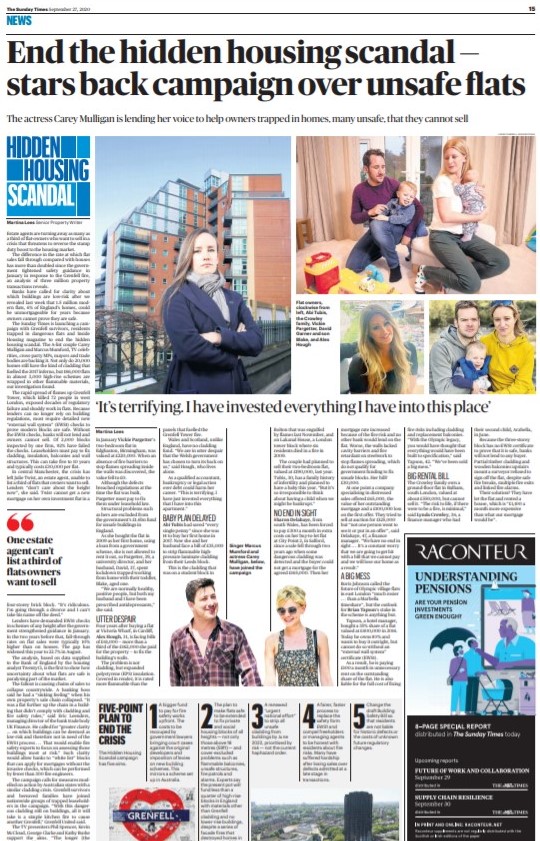
What was the best thing about running a campaign?
The opportunity to really help people. It is quite rare in journalism to be able to write something that makes a real difference. Campaigns are also important for brands like The Sunday Times, because it is what readers come to us for. It defines the paper – and you as a journalist.
What was the biggest challenge?
To keep it going and to keep setting the agenda. After we launched our campaign, other newspapers, such as the Daily Mail, also launched campaigns on the same topic. Being a Sunday paper meant we could publish only once a week, not seven days. I have tried to think ahead about what the big questions are to answer, what will make the biggest difference, and then get those answers, rather than competing with other papers and the BBC to report on the details of day-to-day news on the subject.
Liz Perkins, Night News Editor, Daily Express
Liz Perkins led the End This Injustice campaign which won an overhaul of the family courts system, making them safer for victims and children. She was a finalist in 2019 and 2020 for Campaign of the Year at the British Journalism Awards and shortlisted at the Press Awards 2020.
“I didn’t realise the scale of the problem within the Family Court and was inundated by letters highlighting the harrowing ordeals faced by mothers and fathers”
How did this campaign start?
I brought in an exclusive story about a woman whose paedophile husband controlled her and her children’s lives through the Family Court. He stopped her from going on holiday, selling her home and their children from changing their surnames even though he abused them. He also live-streamed the abuse to other paedophiles. The shocking nature of the case led our editor-in-chief Gary Jones to call for it to become a campaign and the End This Injustice crusade was born. I didn’t realise the scale of the problem within the Family Court and was inundated by letters highlighting the harrowing ordeals faced by mothers and fathers.
What was the best thing about running a campaign?
Inspiring the Government to pledge to overhaul the Family Court due to my campaign coverage and seeing non-fatal strangulation, post-separation abuse and threats to share intimate images become stand-alone criminal offences, which I also crusaded for. There are still further changes that I fought for, including MAPPA (multi-agency public protection arrangements) covering repeat offenders, which is an amendment in the Domestic Abuse Bill that has been backed in the House of Lords. The campaign is on the cusp of changing the law and I’m proud of the achievement.

